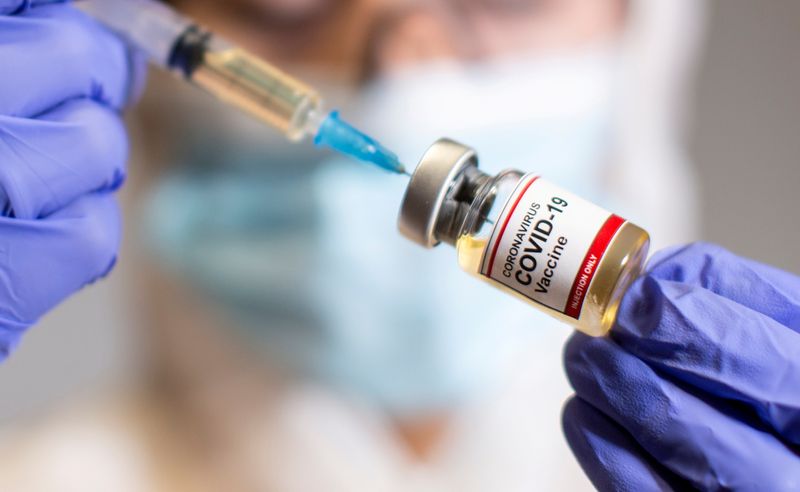By Ludwig Burger and Kate Kelland
FRANKFURT/LONDON (Reuters) - Governments and officials are voicing hopes that COVID-19 vaccines could bring "herd immunity", with some calculating that immunising just two-thirds of a population could halt the pandemic disease and help protect whole communities or nations.
But the concept comes with caveats and big demands of what vaccines might be capable of preventing. Some experts say such expectations are misplaced.
For a start, figuring out what's needed to achieve herd immunity with COVID-19 vaccines involves a range of factors, several of which are unknown.
What is the rate of the spread of the COVID-19-causing virus? Will the first vaccines deployed be able to stop transmission of the virus, or just stop people getting ill? How many people in a population will accept a vaccine? Will vaccines offer the same protection to everyone?
"Herd immunity is sometimes wrongly understood as individual protection," said Josep Jansa, an expert in health emergency preparedness and response at the Stockholm-based European Centre for Disease Prevention and Control (ECDC).
"It's inappropriate to think 'I will not be affected myself because there is herd immunity'. Herd immunity refers to community protection, not to how an individual is protected."
The ECDC uses an estimated herd immunity threshold of 67% for its models, while Chancellor Angela Merkel said this month that COVID-19 restrictions in Germany could be lifted if 60% to 70% of the population acquired immunity, either via a COVID-19 vaccine or through infection.
World Health Organization experts have also pointed to a 65%-70% vaccine coverage rate as a way to reach population immunity through vaccination.
"The idea of herd community is to protect the vulnerable," said Eleanor Riley, a professor of immunology and infectious disease at the University of Edinburgh. "And the idea behind it is that if, say, 98% of a population have all been vaccinated, there will be so little virus in the community that the 2% will be protected. That's the point of it."
REPRODUCTION RATE IS CRUCIAL
Central to the public health calculations on this concept for COVID-19 is the reproduction rate, or R value, of the virus that causes it. This is a measure of how many other people an average infected person passes a pathogen on to in "normal", or restriction-free, circumstances.
Assuming complete vaccine efficacy, herd immunity percentage thresholds for infectious diseases are calculated by dividing 1 by the R value, deducting the result from 1, and multiplying by 100.
For instance, herd immunity from highly contagious measles, with an estimated R value of 12 or higher, will kick in only if 92% or more within a group are immune. For a seasonal flu strain that could have an R value of 1.3, the threshold would be just 23%.
"The problem is that for now we don’t know exactly how fast the virus spreads without any precautions and with the normal travel and social activities we had a year ago," said Winfried Pickl, professor of immunology at the Medical University of Vienna.
With so many countries still operating in far from normal circumstances, the assumption should be that the COVID-19 R value would be "closer to 4 than to 2", he said, since even with semi- or full lockdown measures the R value is around 1.5.
Additionally, anything less than 100% vaccine efficacy - such as the 90% or so suggested in early data on the Pfizer-BioNTech and Moderna (NASDAQ:MRNA) COVID-19 shots - would require a matching rise in percentage of coverage to reach herd threshold.
Amesh Adalja, a scholar at the Johns Hopkins Center for Health Security, said a good target for immunity in the United States would be for more than 70% of the population to be inoculated, but added that the figure could go up if vaccines are less effective.
STOP TRANSMISSION IN THE "HERD"?
Experts say another important factor is whether the COVID-19 vaccines a government chooses to deploy can stop transmission of the virus.
Evidence so far suggests the first COVID-19 vaccines to come to market will at least stop people developing the disease. But it cannot be ruled out that people will still catch the SARS-CoV-2 virus and pass it on to others unnoticed.
"While protection against illness has a value for an individual, it will not prevent circulation of virus and risk of disease in unvaccinated (people)," said Penny Ward, a visiting professor in pharmaceutical medicine at King’s College London.
Bodo Plachter, a professor and deputy director of the Institute of Virology at Germany's Mainz University teaching hospital, said that respiratory infections in particular can be hard to block completely with vaccines - although the shots will go some way to reducing the amount of circulating virus.
"It may well be that vaccinated people will shed fewer viruses," he said. "But it would be a mistake to assume vaccination alone can suppress a pandemic."
FOCUS ON PROTECTING THE VULNERABLE?
Edinburgh's Riley said this suggests that for now, pursuing an idea of herd immunity through COVID-19 vaccination is fruitless.
A better approach, she said, could be to "turn herd immunity on its head", and use the first limited supplies of vaccines to protect those most in need, without worrying about the more robust members of the "herd" who can live relatively happily with the virus.
"Let's forget about protecting the masses to protect the vulnerable," she said. "Let's directly protect the vulnerable."
